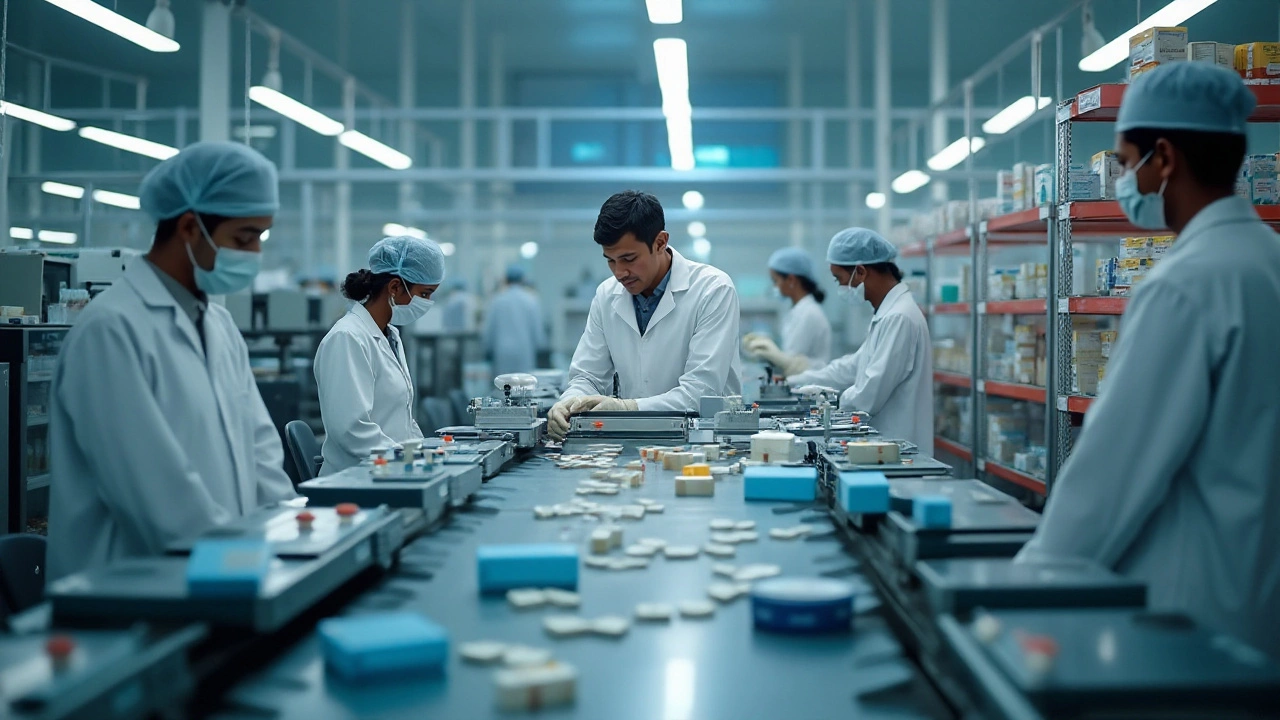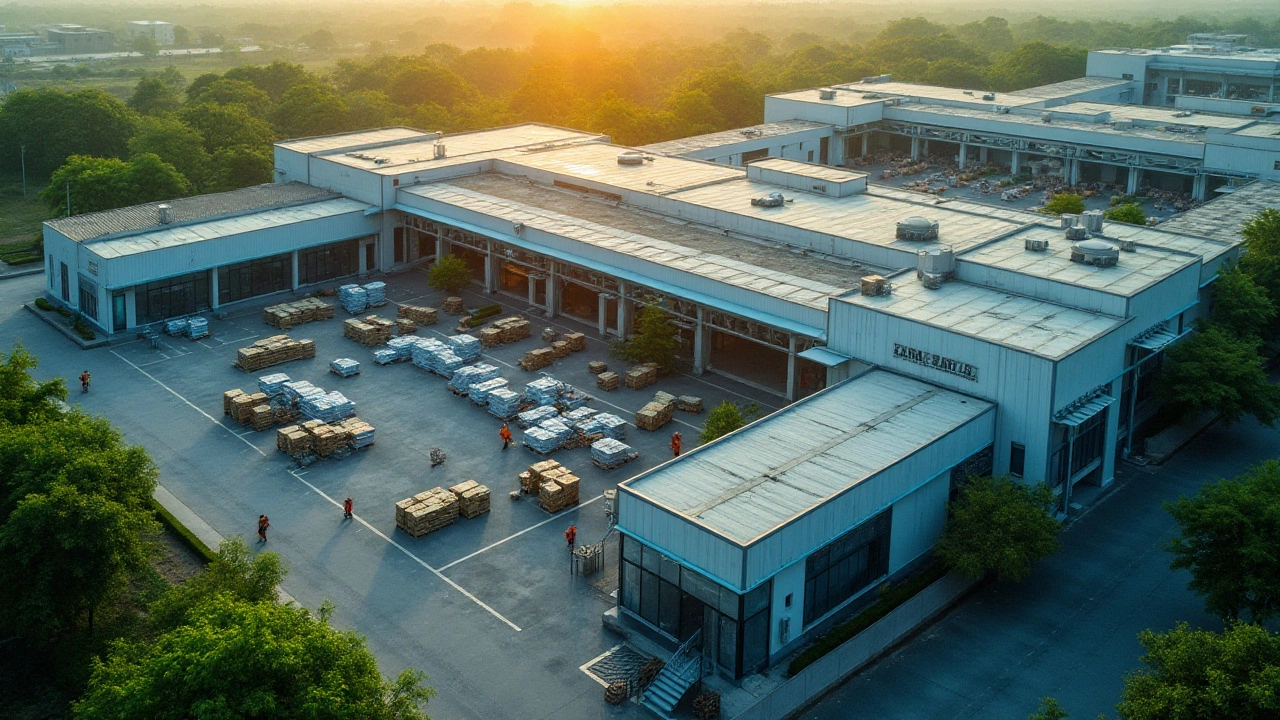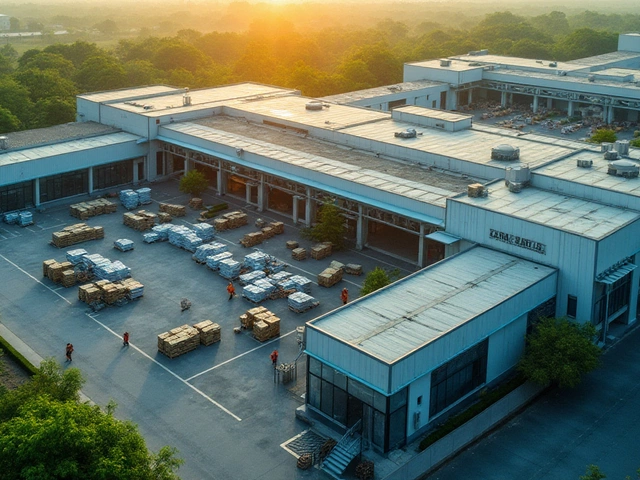Cipla is a cornerstone in the pharmaceutical landscape of India, renowned for its extensive network of manufacturing plants that keep the nation’s healthcare needs well-supplied. Founded with the mission to ensure access to high-quality medicines, Cipla has expanded its reach significantly. The strategic dispersion of its manufacturing units across India not only aids in efficient distribution but also reinforces its commitment to cutting-edge innovation and quality.
As we delve into the details of Cipla's manufacturing prowess, it's essential to understand how these plants are integral to their operations. From producing life-saving medications to embracing new technologies for better efficacy, each plant plays a unique role in Cipla's overarching mission of healthcare excellence. Get ready to uncover the pivotal role these facilities play in shaping India's pharma industry landscape.
- Introduction to Cipla
- Locations of Cipla Plants
- Operations and Capacity
- Strategic Importance
- Future Developments
Introduction to Cipla
Cipla, established in 1935 by visionary entrepreneur Khwaja Abdul Hamied, has transformed into one of India’s foremost pharmaceutical giants with operations extending globally. Initially formed during the pre-independence era, Cipla was driven by the desire to secure affordable and accessible healthcare products for the common public. Over the decades, it has played a significant role in combating healthcare challenges, both domestically and internationally. The company’s foundation laid in Mumbai has now expanded into a robust global network, boasting a presence in over 80 countries.
Since its inception, Cipla has prided itself on its twofold mission: to make medications accessible and affordable, but without compromising on quality. Their emphasis on innovation and research has allowed them to develop an extensive range of pharmaceuticals, with over 1,500 products across various therapeutic categories. With a passionate drive for public health outcomes, Cipla’s effort has made previously unaffordable and inaccessible medicines available within reach. This commitment is underscored by their role in producing antiretroviral drugs, tackling the HIV epidemic in Africa in ways that have saved countless lives.
Cipla plants strategically located throughout India form the backbone of its operations, allowing the company to meet the diverse healthcare needs head-on. One of the remarkable feats of Cipla is its cost-effective drug production strategies that align with its ethos of affordability. Building plants in various regions reflects Cipla’s aim to maintain efficiency in distribution and manufacturing costs, which inevitably translates into lower prices for their consumers. As part of its expansion, Cipla has invested heavily in establishing rigorous quality assurance practices, ensuring each facility adheres to international norms and processes.
Dr. Yusuf K. Hamied, a stalwart figure within the company, once articulated the value-driven mission with passion: "We exist because we are in constant battle against life-threatening diseases; that's our call to action."
Cipla’s manufacturing capabilities are supported by advanced technological tools, reinforcing their tagline of "Caring for Life." While most recognize Cipla for its contributions in respiratory care and HIV/AIDS treatment, their operations encompass a broad spectrum of healthcare solutions. Pharmaceutical manufacturing at Cipla is not just about producing drugs; it’s a complex orchestration of research, development, and sustainable practices. They also play a pivotal role in environmental stewardship through their green initiatives in industrial operations, setting an industry benchmark in compliance with eco-friendly standards. This sustainable approach ensures their growth is socially responsible.
With champions like Cipla, the pharmaceutical industry in India serves not just as a business entity but as a vigilant guardian of health. Through strategic innovations and an ever-expanding portfolio, Cipla continues to stand as a testament to human ingenuity and compassion in the pharma world.
Locations of Cipla Plants
Cipla, a stalwart in India's pharmaceutical scene, operates an impressive network of Cipla plants in India that serve as the backbone for its diverse product range. The company has strategically positioned its facilities across the country to leverage logistical advantages while ensuring prompt distribution to both urban and rural areas. Among these, notable sites include the plant in Kurkumbh, Maharashtra, which is renowned for its advanced manufacturing technologies and adherence to high-quality standards. This facility plays a critical role in the production of a wide variety of medications, meeting both domestic and international demands.
In the heart of the southern region, the Bengaluru plant stands as another key node in Cipla's manufacturing framework. This site is particularly focused on the production of respiratory products, an area where Cipla has been a pioneer. The Bengaluru plant's emphasis on innovative treatments for respiratory ailments showcases Cipla's commitment to specialization and care. Additionally, Cipla's Indore plant in Madhya Pradesh is known for its robust capacity that includes the production of generic formulations catering to numerous therapeutic segments.
The ambitions of Cipla don't just stop at having multiple plants; growth and expansion are also on the agenda. Their facility in Goa is an example of a versatile plant that supports the company's expansion strategies, focusing on efficiency and sustainability. This plant has been recognized for its clean technology and minimal environmental impact approaches. Another significant site is the Patalganga unit, which has been involved in scaling up production to meet increasing global demands, a testament to Cipla's agile and forward-thinking approach. As the company expands, such facilities continue to adapt and innovate to keep pace with the evolving pharmaceutical landscape.
Moreover, Cipla's focus extends towards integrating state-of-the-art technology across its plants. According to a report by the Indian Pharmaceutical Association, "Cipla's dedication to incorporating cutting-edge technology helps maintain its leadership in the pharmaceutical industry." The company's proactive steps towards modernization are visible in its Ulwe plant, which employs automated production lines that ensure precision and reliability in manufacturing processes. This use of modern techniques not only enhances productivity but also showcases Cipla's dedication to maintaining stringent quality controls.
The locations and functionality of Cipla plants in India encompass a blueprint for achieving operational excellence. By ensuring each plant's specialty aligns with specific healthcare demands, Cipla efficiently meets market needs while contributing to community healthcare objectives. These strategically placed plants reinforce Cipla's ongoing commitment to accessibility, affordability, and high-quality healthcare solutions, further bolstering India's standing in the global pharmaceutical arena.

Operations and Capacity
Delving into the operational prowess and capacity of Cipla’s manufacturing plants, it is evident that Cipla stands as a titan in the pharmaceutical manufacturing sector. These plants are meticulously structured to manage a diverse portfolio of products ranging from respiratory to antiviral medications. Cipla’s operations are driven by a village of nearly 55 manufacturing plants situated strategically across India. Each facility is designed to cater to particular therapeutic domains, ensuring optimized workflow and reduced bottlenecks in production processes.
A remarkable aspect of Cipla's operations is its adherence to quality standards and management systems recognized globally, such as ISO certifications and USFDA approvals. These plants are highly automated, reducing manual intervention, thereby minimizing human errors while bolstering efficacy through advanced technology. Their production capacity spans billions of dosage units annually, a testament to their robust infrastructure and strategic foresight. The plants employ nearly 25,000 individuals, each contributing to the meticulous and sophisticated processes that uphold Cipla’s reputation for quality.
Innovative Processes and Robust Infrastructure
Throughout the years, Cipla’s operations have embraced innovative processes like continuous manufacturing and integrated quality assessment systems. Such methods have redefined efficiency dynamics within Cipla production facilities, promoting consistency and quality control. Moreover, Cipla has invested significantly in expanding its capabilities for manufacturing biological products, a decision aligning with global trends towards biologics. These facilities are equipped to support large-scale production while ensuring flexibility for small batch manufacturing, crucial for the rapid deployment of emergent therapies.
Noteworthy is Cipla’s commitment to sustainability. Their green initiatives, such as zero liquid discharge systems and solar energy utilization, mirror their dedication to environmental stewardship. A vital component of their operations is the continuous investment in R&D facilities adjacent to manufacturing units, fostering an environment where innovation meets execution. A leadership statement encapsulates this ethos:
“Continuous improvement and commitment to sustainable practices are the keystones of Cipla’s operational strategy.”
Strategic Competitiveness
Cipla’s capacity isn’t just about quantity; it is a refined balance of quality, flexibility, and strategic foresight. They have maintained competitiveness by implementing digital transformation strategies, such as intelligent supply chains and data-driven decision-making, elements crucial to the agility of modern pharmaceutical operations. Aligning closely with market demands, Cipla’s manufacturing units are capable of agile responses, adapting swiftly to changes, whether it’s scaling up production during a crisis or pivoting lines to cater to a groundbreaking drug.
The strength of Cipla’s manufacturing is a blend of state-of-the-art infrastructure, strategic positioning, and a workforce ingrained with a culture of excellence. These elements together ensure that Cipla remains at the forefront of meeting the healthcare demands, not only in India but on a global scale, ready to embrace future challenges and advancements.
Production Capacity Insights
A brief glance at Cipla's production reveals operations that can clock anywhere from small volumes of specialty drugs to massive numbers of generic medications. In a hypothetical table showing capacity distribution, it would be clear to see how each facility contributes to the overall mission:
| Product Category | Annual Production Capacity |
|---|---|
| Respiratory | 200 million inhalers |
| Antiviral | 500 million tablets |
| Oncology | 200 million units |
This operational synergy illustrates not just a scale of production that meets local and international demands but underscores Cipla’s overarching strategy to innovate and integrate with global pharmaceutical needs efficiently.
Strategic Importance
Understanding the strategic importance of Cipla plants in India requires a glimpse into the broader picture of the pharmaceutical industry and its distribution networks. Cipla's decision to establish multiple manufacturing facilities across various regions in India reflects a well-thought-out strategy aimed at optimizing production, ensuring consistent supply, and maintaining cost efficiency. By dispersing its plants, Cipla not only reduces logistics costs but also minimizes risks associated with supply chain disruptions. This is crucial in a populous nation where timely access to medicines can dramatically impact public health outcomes.
Cipla’s strategic positioning of these plants allows the company to tap into regional specialties and resources. For instance, locating a plant near a specific raw material source can reduce transportation times and costs, while proximity to major markets facilitates quicker delivery of pharmaceutical products. This geographic spread also enhances their operational resilience, enabling the company to swiftly adapt to regional demands and regulatory changes. A distributed manufacturing network can also efficiently handle fluctuating demand, a reality that became all too evident during the global health events of recent years.
An additional layer of strategic value comes from the ability to leverage regional trade benefits and government incentives designed to promote industrial growth. Cipla’s plant setups often align with areas where such advantages are maximized, improving competitiveness and profitability. This foresight not only elevates the company’s economic standing but also bolsters its capability to invest in research and development. Such investments have historically led to groundbreaking products that further enhance Cipla’s reputation as a leader in pharmaceutical innovation.
"By integrating scalability with geographic advantage, Cipla ensures its role as a crucial player in global pharmaceutical supply chains."—Pharma Industry Analyst, Global Insights Magazine
Moreover, the presence of Cipla plants across different regions facilitates a culturally sensitive approach to healthcare solutions. Understanding regional healthcare challenges and preferences allows the company to tailor its offerings more precisely. This not only fosters a stronger connection with the end-users but also enables the continuous gathering of invaluable data, feeding back into the cycle of innovation. The resulting adaptability ensures Cipla remains relevant in an ever-evolving market, securing its position not just as a supplier, but as a vital driver of health outcomes.
To put their strategic alignment in perspective, consider the following data representing workforce distribution and production capacities across Cipla’s primary locations. This table offers insight into the strategic operational capacity that supports Cipla's extensive output:
| Plant Location | Employees | Monthly Production Capacity (Units) |
|---|---|---|
| Goa | 2,500 | 10 million |
| Dharavi | 1,800 | 8 million |
| Sikkim | 1,200 | 5 million |
| Indore | 2,000 | 9 million |
This strategic approach has become a blueprint in the industry, with Cipla setting standards on how geographical diversity can enhance operational flexibility and responsiveness. The company's success highlights the importance of not merely having a presence but having the right presence in key areas. It underscores a philosophy where being closer to the people it serves translates to better service delivery and healthcare outcomes. In doing so, Cipla not only protects its market share but also expands its influence in the global sphere of pharmaceuticals.

Future Developments
As the pharmaceutical industry leaps forward with unprecedented technological advancements and challenges, Cipla stands ready to usher in a new era marked by innovation and expansion. In recent years, they have diligently worked to enhance and modernize their manufacturing infrastructure and processes. This is crucial for maintaining their position at the forefront of the industry. These initiatives not only aim at increasing the production capacity of their existing Cipla plants in India but also strive to integrate sustainable practices that minimize environmental impact.
It is expected that in the coming years, Cipla will further diversify its product portfolio, responding to evolving healthcare demands both domestically and globally. Bio-pharmaceuticals, an emerging field of medicine, particularly interest Cipla, with plans to invest heavily in research and development. This focus aligns with the global shift towards personalized medicine aimed at the precise treatment of individual health issues. Preparing for these trends ensures Cipla’s adaptability and the continuation of its legacy of innovation.
Cipla's commitment to cutting-edge technologies isn't limited to production alone. They are also exploring digital transformation within their operational workflow. This encompasses the adoption of artificial intelligence and machine learning to optimize manufacturing processes, reduce waste, and ensure stringent quality control. A representative from Cipla was quoted as saying, "Our integration of AI into manufacturing processes seeks not only to enhance efficiency but also to pave the way for smarter healthcare solutions."
The future belongs to companies that blend traditional excellence with high-tech innovation.
Strategically, Cipla aims to increase its manufacturing footprint by setting up new facilities in under-served regions across India. The emphasis is on elevating healthcare accessibility in rural areas, which has historically faced significant challenges. These future pharmaceutical manufacturing plants are expected to also create thousands of new jobs, providing economic benefits to these communities.
Moreover, Cipla has pledged to reinforce its dedication to sustainable energy practices. New and existing facilities are being reassessed for better energy performance, with several plants already retrofitted with solar power systems. As sustainability becomes a defining attribute for industry leaders, Cipla's plans indicate a profound step toward reducing their carbon footprint while setting benchmarks for peers in the industry. These initiatives are not just about meeting regulations but resonate with a global push towards sustainable economic growth.





Write a comment